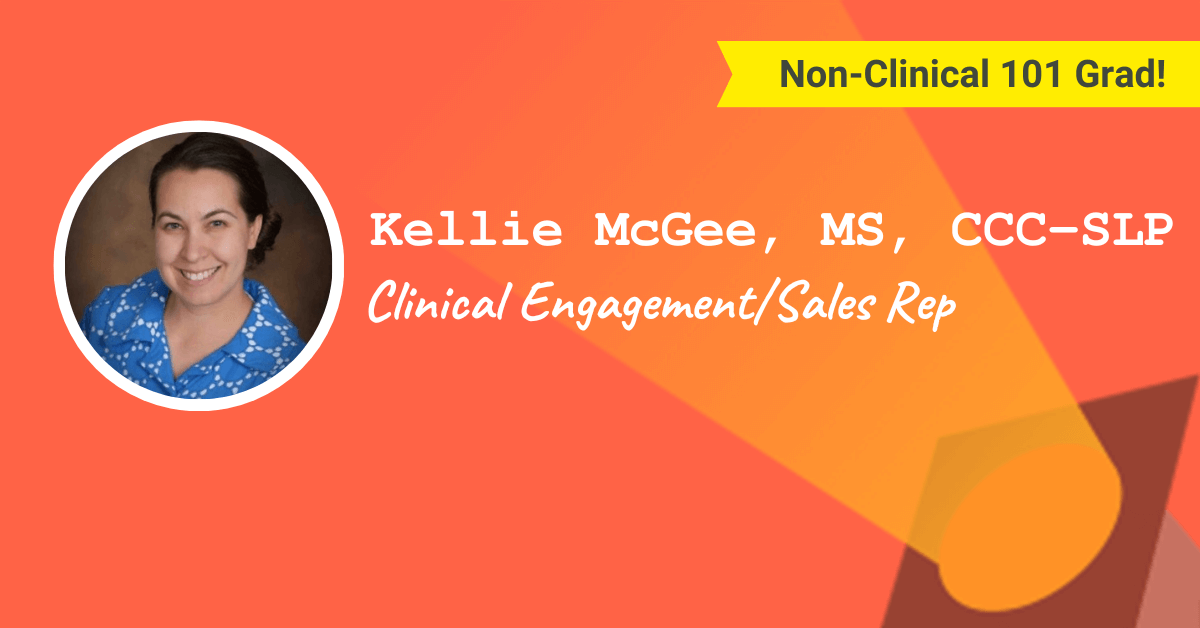This week’s spotlight is on Kellie McGee, MS, CCC-SLP, a Non-Clinical 101 graduate who is now Clinical Engagement/Sales Rep for Laronix!
This post may contain affiliate links or codes. This won’t increase your cost, but it helps keep TNCPT alive, and free of annoying ads! Thank you for your support. 🙂
What is your full name, title, and company name for your current, primary role?
Kellie McGee, MS, CCC-SLP — Clinical Engagement/Sales Rep for Laronix

Where are you located?
Keller, Texas
Where did you go to SLP school, and what year did you graduate?
Texas Christian University, 2003.
Please refrain from contacting our spotlight participants on social media. There are thousands of readers just like you out there. 🙂 Please ask your questions in the comments on this blog post.
If you’re a Non-Clinical 101 student, you can network with many of our spotlight participants in the alumni groups!
What did you do when you first finished school, and for how long?
I completed my clinical fellowship year with Early Childhood Intervention (ECI) and contracted with them for several years. Once I received my CCCs, I transitioned to acute and outpatient adult therapy.
In what setting(s) did you work, and what types of patients did you treat?
I have worked in a variety of settings, including public school, home health, inpatient rehab, acute care, and outpatient. The ages of patients ranged from pediatrics to adults. Most of my experience (15+ years) comes from acute care, which is where I love most to work.
What did you enjoy about your early roles? What didn’t you enjoy?
I enjoyed the fast pace, collaborating with the medical team, and playing a critical role in a patient’s recovery. I loved being part of any new documentation framework, working on committees, and establishing policies.
I did not enjoy the lack of career and financial growth or the inflexibility of hours.
What else have you done since then, prior to your current role?
For the first time since I began working as a teenager, I took a year and a half off of work to concentrate on my family and my hobbies.
When and why did you decide to do something non-clinical?
After 15 years as a part-time SLP, my company gave me an ultimatum to either go full time with inflexible hours or to work weekends only. I then decided to take some time off and re-evaluate where I wanted my career to go.
I love research, so I began to research “me.” I dove into lots of personality assessments. I decided I would love to work from home and do something a little different than direct patient care.
What are you doing these days?
I am working as a clinical engagement/sales rep for a company called Laronix. Laronix is a small company focused on non-invasive voice solutions for voice loss.
Are you still treating patients, or are you solely non-clinical?
I am solely non-clinical, BUT I use my clinical knowledge and skills in this role.
How long have you been in your current clinical engagement role?
Since May 2023.
Did you get any special certifications or training along the way to help you get into your current role?
I enrolled in Non-Clinical 101.
How did you find your job? Did you apply or find it through a connection?
I found my job through a post in the Non-Clinical 101 alumni group. The company was looking for SLPs in their state, but I reached out to them and asked them to consider hiring me to work remotely. They did!
Did you do anything special to your resume and cover letter to land the job?
I customized every resume and cover letter to support the listed job description.
What was the interview like for the clinical engagement/sales role?
It was honestly very easy and done via a Zoom call. I think I had two different interviews before getting the job offer.
What are some of the things you did to stand out, take initiative, and advance in your career?
I took a role at a new hospital, which included marketing, establishing departmental policies, and launching the inpatient/outpatient services.
How have people reacted to you leaving patient care?
I have received nothing but favorable reactions. Friends, co-workers, and family are happy that I have found a role that is flexible and still utilizes my clinical skills.
What’s a typical day or week in the life like for you? What types of tasks and responsibilities fill your time?
A typical week is project-focused meetings, responding to emails, and conducting sales presentations. The irony in that statement is that there really isn’t a typical week, which is what I LOVE.
Last week, I traveled and spoke at a support group meeting. This week, I am working on brochures that will be included in our packaging and processes to implement for customer follow-up. I get to do a little user experience (UX), project management, and networking all in one week.
What are some of the rewards of your role? What are the biggest challenges?
Flexibility and autonomy over my schedule are the most significant rewards for me. I love being a part of something greater and being able to give a voice to the voiceless.
I have been brought to tears at being able to hear somebody communicate for the first time after having lost their voice. Some of our clients have not been able to voice in several months.
The biggest challenges are feeling a bit isolated, as I am the only remote full-time employee, and keeping my work/home environment quiet.
How did your clinical background prepare you for this role? Which skills transferred?
My clinical knowledge of laryngectomees and their care helped prepare me.
My clients are medical SLPs and their patients. Understanding their work stream, processes, and limitations has helped me connect with them, which somebody with no clinical experience could not do.
In acute care, I “sold” and taught my recommendations to patients, nurses, and medical teams all day long. This was a highly transferrable skill.
Roughly speaking, how are the hours and pay compared to patient care?
The pay is the same, but I am now salaried and have benefits.
I made the same hourly pay in my hospital role for the last 10 years with no increases. I have the potential to make a lot more in this company and role.
What type of person do you think would do well in your clinical engagement role?
Being able to network and connect with people is important. Being organized, driven, and flexible is also important. This role would not be good for somebody who likes to do the same thing every day with no disruptions.
Does your organization hire PT, OT, or SLP professionals into non-clinical roles? If so, what type of roles?
Not yet, but after the product is commercially available, we will expand operations to include more SLPs.
Did you read any books, take any courses, or do anything special overall to get you where you are today?
No, other than the tools offered in the Non-Clinical 101 course.
What is a typical career path for someone in your clinical engagement/sales role?
A typical career path is transitioning from clinical experience to sales.
What is next for you? What are your high-level career aspirations?
The next step is to get our device on the market and accessible to patients who need it. My high-level career aspirations are to work at the executive level and in operations.
What would you recommend to someone who is considering going into a role like yours? Do you have any special words of wisdom for the readers?
Be willing to think outside the box, which, as therapists, we are so good at. Tailor your resume and cover letter to include your sales and admin experience.
What would you like to change most in your profession, and why? How would you propose doing so?
This is a loaded question since I could write a book to answer it. If I were to keep it simple, I would increase the value placed on SLPs (and therapist) and their skills. The career and financial growth has a ceiling, whereas in my husband’s IT world, for example, they make four to ten times more than my salary would ever top out at.
What career advice would you give yourself that you wish you had during school?
At the end of the day, know yourself and what actually makes you happy. It’s more than a title and what you want to be when you grow up. It is all the little things that go into the day and the fabric of your family.





